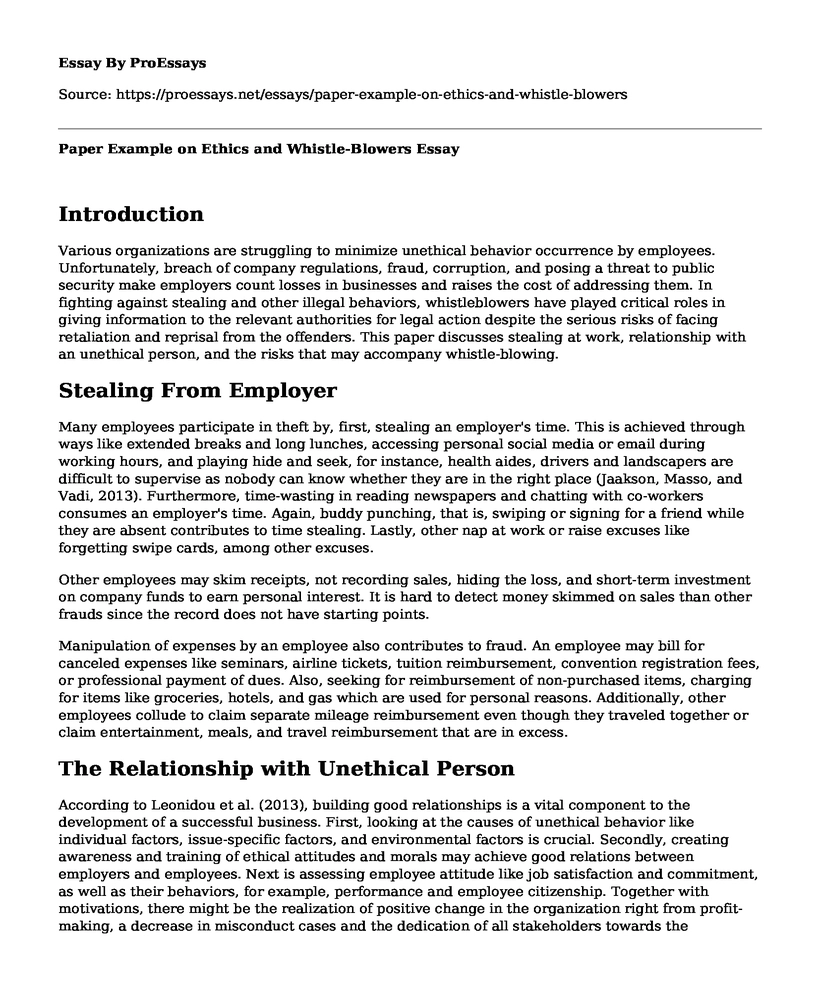Introduction
Various organizations are struggling to minimize unethical behavior occurrence by employees. Unfortunately, breach of company regulations, fraud, corruption, and posing a threat to public security make employers count losses in businesses and raises the cost of addressing them. In fighting against stealing and other illegal behaviors, whistleblowers have played critical roles in giving information to the relevant authorities for legal action despite the serious risks of facing retaliation and reprisal from the offenders. This paper discusses stealing at work, relationship with an unethical person, and the risks that may accompany whistle-blowing.
Stealing From Employer
Many employees participate in theft by, first, stealing an employer's time. This is achieved through ways like extended breaks and long lunches, accessing personal social media or email during working hours, and playing hide and seek, for instance, health aides, drivers and landscapers are difficult to supervise as nobody can know whether they are in the right place (Jaakson, Masso, and Vadi, 2013). Furthermore, time-wasting in reading newspapers and chatting with co-workers consumes an employer's time. Again, buddy punching, that is, swiping or signing for a friend while they are absent contributes to time stealing. Lastly, other nap at work or raise excuses like forgetting swipe cards, among other excuses.
Other employees may skim receipts, not recording sales, hiding the loss, and short-term investment on company funds to earn personal interest. It is hard to detect money skimmed on sales than other frauds since the record does not have starting points.
Manipulation of expenses by an employee also contributes to fraud. An employee may bill for canceled expenses like seminars, airline tickets, tuition reimbursement, convention registration fees, or professional payment of dues. Also, seeking for reimbursement of non-purchased items, charging for items like groceries, hotels, and gas which are used for personal reasons. Additionally, other employees collude to claim separate mileage reimbursement even though they traveled together or claim entertainment, meals, and travel reimbursement that are in excess.
The Relationship with Unethical Person
According to Leonidou et al. (2013), building good relationships is a vital component to the development of a successful business. First, looking at the causes of unethical behavior like individual factors, issue-specific factors, and environmental factors is crucial. Secondly, creating awareness and training of ethical attitudes and morals may achieve good relations between employers and employees. Next is assessing employee attitude like job satisfaction and commitment, as well as their behaviors, for example, performance and employee citizenship. Together with motivations, there might be the realization of positive change in the organization right from profit-making, a decrease in misconduct cases and the dedication of all stakeholders towards the achievement of organization goals.
Risks That May Accompany Whistle-Blowing
Public trust damage, individual harm, and the national security threat are some of the harm that may face whistleblowers. Media may use negative words like traitor, controversial, or treason to intimidate whistleblowers. Again, exposing their identities is a risk. Further, the accused also develops an emotional strain that poses danger to the whistleblower, especially, when leaders are exposed. It is, therefore, important for the authorities to formulate guidelines that may be useful in safeguarding whistleblowers, (Liu et al. 2018).
Conclusion
Unethical behavior like stealing from an employer can be curbed if organizations invent a strong strategic plan that includes focusing on ethical, social, economic, and legal responsibilities as well as the awareness campaign on illegal behavior. Managers must strengthen the ethical climate within their organizations which have benefits for the performance of the company, employees, and society. Employees are also encouraged to demonstrate positive characters such as reliability, high integrity, and fairness. The government can also step in by creating oversight bodies to carry out independent audits on employees. Finally, sustainability of the organizations depends entirely on honesty among stakeholders, respect for the time as well as between individuals, teamwork, and protection of whistle-blowers of any illegal activities.
References
Jaakson, K., Masso, J., & Vadi, M. (2013). The drivers and moderators for dishonest behavior in the service sector. In (Dis) Honesty in Management (pp. 169-193). Emerald Group Publishing Limited.
Leonidou, C. N., Leonidou, L. C., Coudounaris, D. N., & Hultman, M. (2013). Value differences as determinants of importers' perceptions of exporters' unethical behavior: The impact on relationship quality and performance. International Business Review, 22(1), 156-173.
Liu, Y., Zhao, S., Li, R., Zhou, L., & Tian, F. (2018). The relationship between organizational identification and internal whistle-blowing: the joint moderating effects of perceived ethical climate and proactive personality. Review of Managerial Science, 12(1), 113-134.
Cite this page
Paper Example on Ethics and Whistle-Blowers. (2022, Jul 29). Retrieved from https://proessays.net/essays/paper-example-on-ethics-and-whistle-blowers
If you are the original author of this essay and no longer wish to have it published on the ProEssays website, please click below to request its removal:
- Strategies of Cultural Competence to Nurses Essay Example
- Paper Example on Physical Therapy: An Important Well-Being Occupation
- OSHA Mandate: Ensuring Workplace Well-Being & Market Data Accuracy - Essay Sample
- Essay Example on Training: Developing Skills to Meet Job Requirements
- Psychological Evaluation of Motivation, Rewards and Human Behavior: Annotated Bibliography
- Theory X & Y: Human Work Inspiration & Management - Essay Sample
- Essay Example on Onboarding: Introducing New Employees to a Comfortable Workplace







